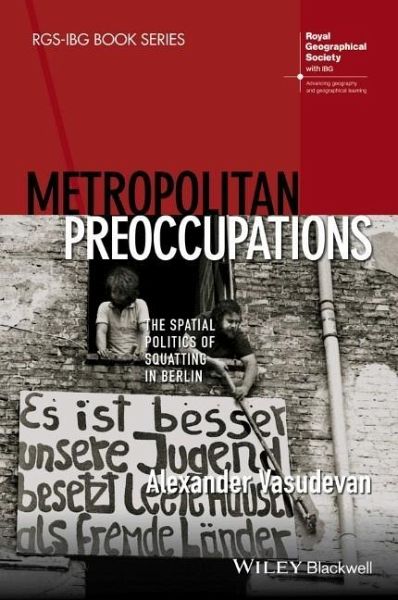
Metropolitan Preoccupations
The Spatial Politics of Squatting in Berlin
Versandkostenfrei!
Versandfertig in über 4 Wochen
38,99 €
inkl. MwSt.
Weitere Ausgaben:

PAYBACK Punkte
19 °P sammeln!
In this, the first book-length study of the cultural and political geography of squatting in Berlin, Alexander Vasudevan links the everyday practices of squatters in the city to wider and enduring questions about the relationship between space, culture, and protest.Focuses on the everyday and makeshift practices of squatters in their attempt to exist beyond dominant power relations and redefine what it means to live in the cityOffers a fresh critical perspective that builds on recent debates about the "right to the city" and the role of grassroots activism in the making of alternative urbanism...
In this, the first book-length study of the cultural and political geography of squatting in Berlin, Alexander Vasudevan links the everyday practices of squatters in the city to wider and enduring questions about the relationship between space, culture, and protest.
Focuses on the everyday and makeshift practices of squatters in their attempt to exist beyond dominant power relations and redefine what it means to live in the city
Offers a fresh critical perspective that builds on recent debates about the "right to the city" and the role of grassroots activism in the making of alternative urbanisms
Examines the implications of urban squatting for how we think, research and inhabit the city as a site of radical social transformation
Challenges existing scholarship on the New Left in Germany by developing a critical geographical reading of the anti-authoritarian revolt and the complex geographies of connection and solidarity that emerged in its wake
Draws on extensive field work conducted in Berlin and elsewhere in Germany
Focuses on the everyday and makeshift practices of squatters in their attempt to exist beyond dominant power relations and redefine what it means to live in the city
Offers a fresh critical perspective that builds on recent debates about the "right to the city" and the role of grassroots activism in the making of alternative urbanisms
Examines the implications of urban squatting for how we think, research and inhabit the city as a site of radical social transformation
Challenges existing scholarship on the New Left in Germany by developing a critical geographical reading of the anti-authoritarian revolt and the complex geographies of connection and solidarity that emerged in its wake
Draws on extensive field work conducted in Berlin and elsewhere in Germany



